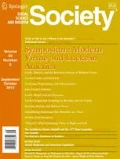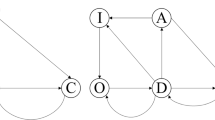Abstract
The fear of a secret Jewish conspiracy that dominates and manipulates the political economy began not long after the Emancipation from the ghettos, and was formalized over a century ago in the Tsarist forgery known as the Protocols of the Elders of Zion. That document itself has been shredded of credibility, but the animating idea of a Jewish cabal continues to show some life. The figure who inadvertently keeps that fantasy alive is the octogenarian financier George Soros (b. 1930), and the attacks upon his ideas and influence are inflected with the paranoid style that had given birth to the discredited Protocols.
Similar content being viewed by others
Notes
Quoted in Marc Santora and Helene Bienvenu, “Having Conquered Hungary, Orban Turns His Focus to Brussels,” New York Times, May 12, 2018, A4; Hannah Beech and Richard C. Paddock, “Malaysia Finds an Unlikely Champion of Democracy,” New York Times, May 12, 2018, A9.
Amotz Asa-El, “By George,” Jerusalem Post, July 14, 2017, 15.
Quoted in Timothy L. O’Brien, “He’s Seen the Enemy. It Looks Like Him,” New York Times, December 6, 1998, 3:1, 11.
Michael Lewis, “The Speculator,” New Republic, 210 (January 10 & 17, 1994), 19.
Jane Mayer, “The Money Man,” New Yorker, 79 (October 18, 2004). 178; 183–84; Lewis, “Speculator,” 20.
Eric Alterman, “The Real Big Lie,” Nation, 305 (September 25/October 2, 2017), 6.
Norman Cohn, Warrant for Genocide: The Myth of the Jewish World-Conspiracy and the Protocols of the Elders of Zion (New York: Harper & Row, 1967), 33–34; Connie Bruck, “The World According to Soros,” New Yorker, 46 (January 23, 1995), 77.
Quoted in Lewis, “Speculator,” 22.
Mayer, “Money Man,” 186, 187; Joshua Muravchik, “The Mind of George Soros,” Commentary, 117 (March 2004), 48; Corey Kilgannon, “Felicia Ferioj! Toasting the Holidays in Esperanto,” New York Times, December 22, 2017, A23; Bruck, “World According to Soros,” 58–59.
Alterman, “Real Big Lie,” 8; David Gelles, “Soros Gives Billions to His Charity, Now the Second Biggest in U. S.,” New York Times, October 18, 2017, B1.
Quoted in Mayer, “Money Man,” 178.
Bruck, “World According to Soros,” 57.
Robert Alan Goldberg, Enemies Within: The Culture of Conspiracy in Modern America (New Haven: Yale University Press, 2001), 16, 172–74.
Richard J. Evans, “A Warning from History,” Nation, 290 (March 20, 2017), 48.
David Redles, “The Turning Point: The Protocols of the Elders of Zion and the Eschatological War between Aryans and Jews,” in The Paranoid Apocalypse: A Hundred-Year Retrospective on The Protocols of the Elders of Zion, eds. Richard Landes and Steven T. Katz (New York: New York University Press, 2012), 117.
Hermann Rauschning, Voice of Destruction (New York: Putnam, 1940), 238–41; Robert G. L. Waite, The Psychopathic God: Adolf Hitler (New York: Basic Books, 1977), 118–19.
Deborah Lipstadt, “The Protocols of the Elders of Zion on the Contemporary American Scene,” in Paranoid Apocalypse, 180, 182, 183.
Richard Landes and Steven T. Katz, “Introduction: The Protocols at the Dawn of the twenty-first Century,” in Paranoid Apocalypse, 2.
Marc Ballon, “Wal-Mart Stops Selling Hate,” Jewish Journal, September 23, 2004, accessed at: http://jewishjournal.com/category/culture/religion/up_front/10240.
Quoted in Frederic Morton, The Rothschilds: A Family Portrait (New York: Atheneum, 1962), 100.
Arthur M. Schlesinger, Jr., “Master Illusionist,” New York Review of Books, 28 (October 8, 1981), 12.
John Buchan, The Thirty-Nine Steps (New York: Penguin Books, 2004), 10–11; Mordecai Richler, Shoveling Trouble (London: Quartet Books, 1973), 62–63.
Author information
Authors and Affiliations
Corresponding author
Rights and permissions
About this article
Cite this article
Whitfield, S.J. The Persistence of the Protocols. Soc 55, 417–421 (2018). https://doi.org/10.1007/s12115-018-0282-6
Published:
Issue Date:
DOI: https://doi.org/10.1007/s12115-018-0282-6




